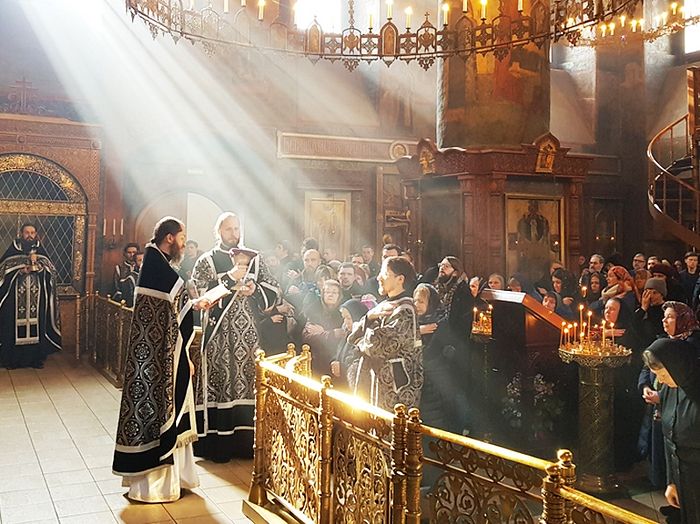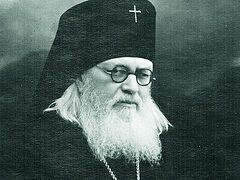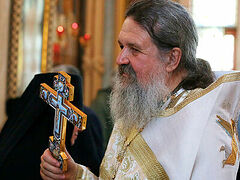On the second Sunday of Great Lent, the Church commemorations the great Holy Hierarch Gregory Palamas. He was a man who dedicated his whole life to the knowledge of God, labored very much, and continually waged a cruel struggle with the heretics and false teachers. Often the teaching that he preached was subjected to doubt, so that all his life he was forced to prove he was right, prove that the path that he and others who listened to him and to Christ followed is the true and saving path. This is the path of particular ascetic labors, with attentiveness to one’s heart and life. He often spoke about divine grace, which we cannot live without, and without which the soul of any Christian or other human being will simply perish, go blind, be silenced, die, and wither up—and his life will become nothing more than a senseless collection of events.
We are very often turned away from divine grace by precisely the vanity of this world, which doesn’t seem so sinful at first glance. This is: acquisitiveness, satisfying our ambitions, and pride—this is what now most often leads people away from God and from the remembrance that we have to continually nourish our lives, our souls.
A man seeks to acquire great riches, striving for something in life. Then the same thing happens to each of us. There is no man living on earth who will not meet death. We will all die, everyone standing here will stand before the Lord—and then we will see that this life of ours, all these cares and thoughts that fill our souls are naught… But they are precisely what hindered us from uniting with the Lord. Only then will it be too late. “When we have acquired the whole world, then will we take up our abode in the grave.” These are the remarkable words of the funeral service. Truly, man acquires the whole world, and then what awaits him? He lies down in his coffin and takes up his abode in the grave. Pauper, rich man, king, and slave alike will lie in the coffin, “without breath, uncomely, unsightly.” And then the people who stand by this coffin will suddenly remember: Behold, this is the end of a man’s life, and it was all just vanity and emptiness.
But it is not in vain today that we commemorate the name of St. Gregory Palamas, and not in vain did he live and labor in Christ’s name and for all our sakes, but in order to leave us the salvific teaching on divine grace, about how it heals us, moves through our lives, and saves and delivers us from this murderous vanity.
In today's Gospel reading we heard how a paralytic was carried to Christ. We now live and use our talents, our abilities, and the positions we hold—and we do not seek Christ. Often in order to begin to place all our hope in Him, and to understand the vanity of our lives, the Lord sends us illnesses, infirmities, and paralysis.
St. Gregory of Palamas also talked about this Gospel reading on the second Sunday of Lent. He said that this paralyzed hope in Christ led to faith. Hope is all he had left, the last thing he had in the world. He no longer had health, or glory, or strength, and only hope in Christ led him to salvation, to healing.
This often happens with us, and we say in our resentment: For what, why? I do everything right, I behave myself properly! Why are these sicknesses and trials being sent to me? They are sent so that hope in God’s grace would come and abide in our hearts! So that those who while healthy and strong do not find the strength in themselves to unite with Christ might be strengthened for the struggle against the vanity of this world.
The paralytic was carried by four men who took apart the roof of the house in order to lower him down to Christ. We also, says St. Gregory Palamas, must scrape away and cast aside the shingles of everyday unnecessary, empty, useless cares, ambitions, and pride in order to get to Christ, in order to lower down to Him our wretched, paralyzed, hungry, and exhausted souls.
Today, every soul unites with divine grace, and we unite with God. No great theological knowledge or scholarliness—although we mustn’t denigrate them—are capable of working so effectively on the human heart and soul as divine grace. Just look at how many examples there are around us of people who have received the highest educations, including theological education, say quite correct things, yet God’s people do not believe them. They speak, but their words don’t affect people’s hearts, because those scholars did not acquire divine grace—which is acquired, of course, through daily ascetic labors, through humility, fasting, prayer, love, and responsiveness to our neighbor’s suffering. May divine grace abide with all of us, through the prayers of St. Gregory Palamas, the Holy New Martyrs and Confessors of the Russian Church, and all the saints.
Amen.




